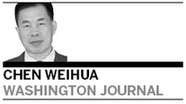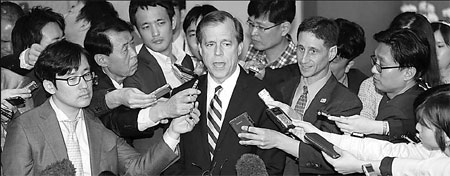US turns to diplomacy with DPRK
|
Glyn Davies, US special representative for policy on the Democratic People's Republic of Korea, answers reporters' questions after his talks with the Republic of Korea's chief delegate to the Six-Party Talks at the ROK Foreign Ministry in Seoul on Tuesday. Lee Jae-Won / Reuters |
Instead of the pure military posturing of several weeks ago, the United States is using both diplomatic and military means these days to deal with the tension on the Korean Peninsula.
On Monday, the US and the Republic of Korea began their two-day joint naval exercises off the east coast of the peninsula, featuring the nuclear-powered aircraft carrier, the 97,000-ton US Nimitz.
As usual, the annual naval drill drew a strong protest from the Democratic People's Republic of Korea. The DPRK's Rodong Sinmun newspaper called the exercises "a dress rehearsal for the invasion of the north and a very dangerous and reckless move", the ROK's Yonhap News Agency reported.
Meanwhile, Glyn Davies, US special representative for policy on the DPRK, is conducting a weeklong trip to the ROK, China and Japan, including meetings on Wednesday and Thursday with senior Chinese officials, such as Wu Dawei, China's special envoy for the Korean Peninsula and chairman of the stalled Six-Party Talks.
On Monday, Davies said he is going to talk to Chinese officials about the steps they have taken and "see if there are not more ways that we can send very strong, united signals" to the DPRK that it is time to "really return to the path of denuclearization and begin to take steps to demonstrate that they are serious about the intent to get back to diplomacy".
Davies described as "interesting" and "hopeful" the actions last week by Chinese banks to close the accounts of the DPRK's Foreign Trade Bank.
"I think that is a very interesting and potentially important development that the steps are being taken by a number of Chinese banks," said Davies, who assumed his post at the end of 2011.
However, Davies said the DPRK's relative quietness lately does not mean an easing of tensions.
He said that easing tensions and making diplomatic progress will come when the DPRK "begins to live up to its obligations and to meet its expectations and gets back on the path of diplomacy and denuclearization".
Reports last week said that the DPRK moved two mobile ballistic missiles from a coastal launch site and toned down its rhetoric.

On Monday, DPRK media reported that its top defense official, Kim Kyok-sik, had been replaced by Jang Jong-nam, an army general.
However, Western analysts said the new appointment of Jang as minister of the DPRK's People's Armed Forces to replace the former hard-line chief does not necessarily reflect a softening of Pyongyang's stance.
Davies' trip came after a flurry of diplomatic activities. ROK President Park Geun-hye paid a five-day visit to the US last week, sending a signal of unity between the US and the ROK on the DPRK as well as openness of diplomatic engagement.
US Secretary of State John Kerry and Chairman of the Joint Chiefs of Staff General Martin Dempsey also visited Beijing last month while Wu Dawei visited Washington, after tensions escalated since the DPRK conducted its third nuclear test in February.
Davies would not comment on the US' and the ROK's difference in terms of attitude toward Japan, saying that the DPRK is a far more important issue.
During Park's visit to the US, she repeatedly expressed her dissatisfaction with Japan's attitude toward World War II history.
In fact, a news release by the US 7th Fleet, which described the ongoing US-ROK joint naval drill as being conducted in "the Sea of Japan," has also stirred controversy in Seoul. For decades, many ROK citizens have been protesting the name and instead called it "East Sea" to refer to the waters off the east coast of the Korean Peninsula.
Contact the writer at [email protected]
(China Daily 05/15/2013 page11)















